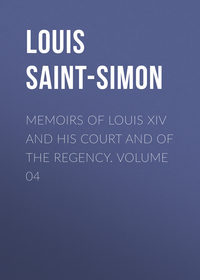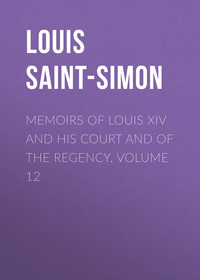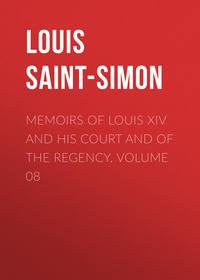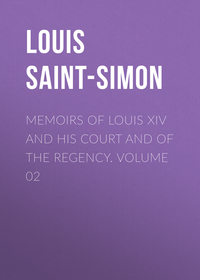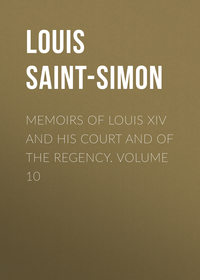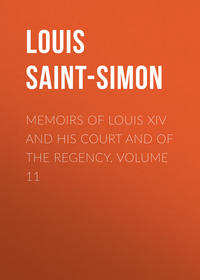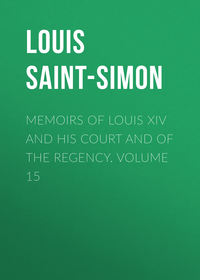 полная версия
полная версияMemoirs of Louis XIV and His Court and of the Regency. Complete
When I was well assured of him, “Admit,” said I, “that the King, in the other world, would be much astonished if he could know that the Duc de Noailles had made you order the destruction of Marly, and that it was who hindered it.”
“Oh! as to that,” he quickly replied, “it is true he could not believe it.” In effect Marly was preserved and kept up; and it is the Cardinal Fleury, with his collegiate proctor’s avarice, who has stripped it of its river, which was its most superb charm.
I hastened to relate this good resolve to the Marechal de Villars. The Duc de Noailles, who, for his own private reasons, had wished the destruction of Marly, was furious when he saw his proposal fail. To indemnify himself in some degree for his vexation, he made the Regent agree, in the utmost secrecy, for fear of another failure, that all the furniture, linen, etc., should be sold. He persuaded M. le Duc d’Orleans that all these things would be spoiled and lost by the time the King was old enough to use them; that in selling them a large sum would be gained to relieve expenses; and that in future years the King could furnish Marly as he pleased. There was an immense quantity of things sold, but owing to favour and pillage they brought very little; and to replace them afterwards, millions were spent. I did not know of this sale, at which anybody bought who wished, and at very low prices, until it had commenced; therefore I was unable to hinder this very damaging parsimoniousness.
The Regent just about this time was bestowing his favours right and left with a very prodigal hand; I thought, therefore, I was fully entitled to ask him for one, which, during the previous reign, had been so rare, so useful, and accordingly so difficult to obtain; I mean the right of entering the King’s room—the ‘grandes entrees’—as it was called, and I attained it at once.
Since the occasion offers, I may as well explain what are the different sorts of entrees. The most precious are called the “grand,” which give the right to enter into all the retired places of the King’s apartments, whenever the grand chamberlain and the chief gentlemen of the chamber enter. The importance of this privilege under a King who grants audiences with difficulty, need not be insisted on. Enjoying it, you can speak with him, tete-a-tete, whenever you please, without asking his permission, and without the knowledge of others; you obtain a familiarity, too, with him by being able to see him thus in private.
The offices which give this right are, those of grand chamberlain, of first gentleman of the chamber, and of grand master of the wardrobe on annual duty; the children, legitimate and illegitimate, of the King, and the wives and husbands of the latter enjoy the same right. As for Monsieur and M. le Duc d’Orleans they always had these entrees, and as sons of France, were at liberty to enter and see the King at all hours, but they did not abuse this privilege. The Duc du Maine and the Comte de Toulouse had the same, which they availed themselves of unceasingly, but by the back stairs.
The second entrees, simply called entrees, were purely personal; no appointment or change gave them. They conferred the right to see the King at his rising, after the grandes, and also to see him, but under difficulties, during all the day and evening.
The last entrees are those called chamber entrees. They also give the right to see the King at his rising, before the distinguished courtiers; but no other privilege except to be present at the booting of the King. This was the name employed when the King changed his coat, in going or returning from hunting or a walk. At Marly, all who were staying there by invitation, entered to see this ceremony without asking; elsewhere, those who had not the entree were excluded. The first gentleman of the chamber had the right, and used it sometimes, to admit four or five persons at the most, to the “booting,” if they asked, and provided they were people of quality, or of some distinction.
Lastly, there were the entrees of the cabinet which gave you the right to wait for the King there when he entered after rising, until he had given orders for the day, and to pay your court to him, and to enter there when he entered to change his coat. Beyond this, the privilege attached to these admissions did not extend. The Cardinals and the Princes of the blood had the entrees of the chamber and those of the cabinet, so had all the chief officials.
I was the first who had the ‘grandes entrees’ from the Regent. D’Antin asked for them next. Soon after, upon this example, they were accorded to D’O. M. le Prince de Conti, the sole prince of the blood who had them not, because he was the sole prince of the blood who did not come from Madame de Montespan, received them next, and little by little the privilege was completely prostituted as so many others were.
By extremely rare good fortune a servant employed in the diamond mines of the Great Mogul found means to secrete about his person a diamond of prodigious size, and what is more marvellous, to gain the seashore and embark without being subjected to the rigid and not very delicate ordeal, that all persons not above suspicion by their name or their occupation, are compelled to submit to, ere leaving the country. He played his cards so well, apparently, that he was not suspected of having been near the mines, or of having had anything to do with the jewel trade. To complete his good fortune he safely arrived in Europe with his diamond. He showed it to several princes, none of whom were rich enough to buy, and carried it at last to England, where the King admired it, but could not resolve to purchase it. A model of it in crystal was made in England, and the man, the diamond, and the model (perfectly resembling the original) were introduced to Law, who proposed to the Regent that he should purchase the jewel for the King. The price dismayed the Regent, who refused to buy.
Law, who had in many things much grandour of sentiment, came dispirited to me, bringing the model. I thought, with him, that it was not consistent with the greatness of a King of France to be repelled from the purchase of an inestimable jewel, unique of its kind in the world, by the mere consideration of price, and that the greater the number of potentates who had not dared to think of it, the greater ought to be his care not to let it escape him. Law, ravished to find me think in this manner, begged me to speak to M. le Duc d’Orleans. The state of the finances was an obstacle upon which the Regent much insisted. He feared blame for making so considerable a purchase, while the most pressing necessities could only be provided for with much trouble, and so many people were of necessity kept in distress. I praised this sentiment, but I said that he ought not to regard the greatest King of Europe as he would a private gentleman, who would be very reprehensible if he threw away 100,000 livres upon a fine diamond, while he owed many debts which he could not pay: that he must consider the honour of the crown, and not lose the occasion of obtaining, a priceless diamond which would efface the lustre of all others in Europe: that it was a glory for his regency which would last for ever; that whatever might be the state of the finances the saving obtained by a refusal of the jewel would not much relieve them, for it would be scarcely perceptible; in fact I did not quit M. le Duc d’Orleans until he had promised that the diamond should be bought.
Law, before speaking to me, had so strongly represented to the dealer the impossibility of selling his diamond at the price he hoped for, and the loss he would suffer in cutting it into different pieces, that at last he made him reduce the price to two millions, with the scrapings, which must necessarily be made in polishing, given in. The bargain was concluded on these terms. The interest upon the two millions was paid to the dealer until the principal could be given to him, and in the meanwhile two millions’ worth of jewels were handed to him as security.
M. le Duc d’Orleans was agreeably deceived by the applause that the public gave to an acquisition so beautiful and so unique. This diamond was called the “Regent.” It is of the size of a greengage plum, nearly round, of a thickness which corresponds with its volume, perfectly white, free from all spot, speck, or blemish, of admirable water, and weighs more than 500 grains. I much applauded myself for having induced the Regent to make so illustrious a purchase.
CHAPTER LXXXV
In 1716 the Duchesse de Lesdiguieres died at Paris in her fine hotel. She was not old, but had been long a widow, and had lost her only son. She was the last relic of the Gondi who were brought into France by Catherine de’ Medici, and who made so prodigious a fortune. She left great wealth. She was a sort of fairy, who, though endowed with much wit, would see scarcely anybody, still less give dinners to the few people she did see. She never went to Court, and seldom went out of her house. The door of her house was always thrown back, disclosing a grating, through which could be perceived a true fairy palace, such as is sometimes described in romances. Inside it was nearly desert, but of consummate magnificence, and all this confirmed the first impression, assisted by the singularity of everything, her followers, her livery, the yellow hangings of her carriage, and the two great Moors who always followed her. She left much to her servants, and for pious purposes, but nothing to her daughter-in-law, though poor and respectful to her. Others got magnificent legacies.
Cavoye died about the same time. I have said enough about him and his wife to have nothing to add. Cavoye, away from Court, was like a fish out of water; and he could not stand it long. If romances have rarely produced conduct like that of his wife towards him, they would with still greater difficulty describe the courage with which her lasting love for her husband sustained her in her attendance on his last illness, and the entombment to which she condemned herself afterwards. She preserved her first mourning all her life, never slept away from the house where he died, or went out, except to go twice a day to Saint-Sulpice to pray in the chapel where he was buried. She would never see any other persons besides those she had seen during the last moments of her husband, and occupied herself with good works also, consuming herself thus in a few years without a single sign of hesitation. A vehemence so equal and so maintained is perhaps an example, great, unique, and assuredly very respectable.
Peter I., Czar of Muscovy, has made for himself, and justly, such a great name, in his own country, in all Europe, and in Asia, that I will not undertake to describe so grand, so illustrious a prince—comparable to the greatest men of antiquity—who has been the admiration of his age, who will be that of years to come, and whom all Europe has been so much occupied in studying. The singularity of the journey into France of so extraordinary a prince, has appeared to me to deserve a complete description in an unbroken narrative. It is for this reason that I place my account of it here a little late, according to the order of time, but with dates that will rectify this fault.
Various things relating to this monarch have been seen in their place; his various journeys to Holland, Germany, Vienna, England, and to several parts of the North; the object of those journeys, with some account of his military actions, his policy, his family. It has been shown that he wished to come into France during the time of the late King, who civilly refused to receive him. There being no longer this obstacle, he wished to satisfy his curiosity, and he informed the Regent through Prince Kourakin, his ambassador at Paris, that he was going to quit the Low Countries, and come and see the King.
There was nothing for it but to appear very pleased, although the Regent would gladly have dispensed with this visit. The expenses to be defrayed were great; the trouble would be not less great with a prince so powerful and so clear-sighted, but full of whims, with a remnant of barbarous manners, and a grand suite of people, of behaviour very different from that common in these countries, full of caprices and of strange fashions, and both they and their master very touchy and very positive upon what they claimed to be due or permitted to them.
Moreover the Czar was at daggers drawn with the King of England, the enmity between them passing all decent limits, and being the more bitter because personal. This troubled not a little the Regent, whose intimacy with the King of England was public, the private interest of Dubois carrying it even to dependence. The dominant passion of the Czar was to render his territories flourishing by commerce; he had made a number of canals in order to facilitate it; there was one for which he needed the concurrence of the King of England, because it traversed a little corner of his German dominions. From jealousy George would not consent to it. Peter, engaged in the war with Poland, then in that of the North, in which George was also engaged, negotiated in vain. He was all the more irritated, because he was in no condition to employ force; and this canal, much advanced, could not be continued. Such was the source of that hatred which lasted all the lives of these monarchs, and with the utmost bitterness.
Kourakin was of a branch of that ancient family of the Jagellons, which had long worn the crowns of Poland, Denmark, Norway, and Sweden. He was a tall, well-made man, who felt all the grandeur of his origin; had much intelligence, knowledge of the way of managing men, and instruction. He spoke French and several languages very fairly; he had travelled much, served in war, then been employed in different courts. He was Russian to the backbone, and his extreme avarice much damaged his talents. The Czar and he had married two sisters, and each had a son. The Czarina had been repudiated and put into a convent near Moscow; Kourakin in no way suffered from this disgrace; he perfectly knew his master, with whom he kept on very free terms, and by whom he was treated with confidence and consideration. His last mission had been to Rome, where he remained three years; thence he came as ambassador to Paris. At Rome he was without official character, and without business except a secret one, with which the Czar had entrusted him, as to a sure and enlightened man.
This monarch, who wished to raise himself and his country from barbarism, and extend his power by conquests and treaties, had felt the necessity of marriages, in order to ally himself with the chief potentates of Europe. But to form such marriages he must be of the Catholic religion, from which the Greeks were separated by such a little distance, that he thought his project would easily be received in his dominions, if he allowed liberty of conscience there. But this prince was sufficiently sagacious to seek enlightenment beforehand upon Romish pretensions. He had sent for that purpose to Rome a man of no mark, but capable of well fulfilling his mission, who remained there five or six months, and who brought back no very satisfactory report. Later he opened his heart in Holland to King William, who dissuaded him from his design, and who counselled him even to imitate England, and to make himself the chief of his religion, without which he would never be really master in his own country. This counsel pleased the Czar all the more, because it was by the wealth and by the authority of the patriarchs of Moscow, his grandfathers, and great-grandfathers, that his father had attained the crown, although only of ordinary rank among the Russian nobility.
These patriarchs were dependent upon those of the Greek rite of Constantinople but very slightly. They had obtained such great power, and such prodigious rank, that at their entry into Moscow the Czar held their stirrups, and, on foot, led their horse by the bridle: Since the grandfather of Peter, there had been no patriarch at Moscow. Peter I., who had reigned some time with his elder brother, incapable of affairs, long since dead, leaving no son, had, like his father, never consented to have a patriarch there. The archbishops of Novgorod supplied their place in certain things, as occupying the chief see after that of Moscow, but with scarcely any authority that the Czar did not entirely usurp, and more carefully still after King William had given him the counsel before alluded to; so that by degrees he had become the real religious chief of his vast dominions.
Nevertheless, the passionate desire he had to give to his posterity the privilege of marrying with Catholic princes, the wish he had, above all, for the honour of alliances with the house of France, and that of Austria, made him return to his first project. He tried to persuade himself that the man whom he had secretly sent to Rome had not been well informed, or had ill understood; he resolved, therefore, to fathom his doubts, so that he should no longer have any as to the course he ought to adopt.
It was with this design that he chose Prince Kourakin, whose knowledge and intelligence were known to him, and sent him to Rome under pretence of curiosity, feeling that a nobleman of his rank would find the best, the most important, and the most distinguished society there ready to receive him; and that by remaining there, under pretext of liking the life he led, and of wishing to see and admire at his ease all the marvels of so many different kinds collected there, he should have leisure and means to return perfectly instructed upon everything he wished to know. Kourakin, in fact, remained in Rome three years, associating with the savans on the one hand and the best company on the other, whence by degrees he obtained all he wished to know; all the more readily because this Court boasts of its temporal pretensions and of its conquests of this kind, instead of keeping them secret. In consequence of the long and faithful report that Kourakin made to the Czar, that prince heaved a sigh, saying that he must be master in his own country, and could not place there anybody greater than himself; and never afterwards did he think of turning Catholic.
This fact respecting the Czars and Rome, Prince Kourakin did not hide. Everybody who knew him has heard him relate it. I have eaten with him and he with me, and I have talked a good deal with him, and heard him talk, with pleasure, upon many things.
The Regent, informed by him of the forthcoming arrival in France of the Czar by sea, sent the King’s equipages; horses, coaches, vehicles, waggons, and tables and chambers with Du Libois, one of the King’s gentlemen in ordinary, to go and wait for the Czar at Dunkerque, pay the expenses incurred by him and his suite on the way to Paris, and everywhere render him the same honour as to the King. The Czar proposed to allot a hundred days to his journey. The apartment of the Queen- mother at the Louvre was furnished for him, the councils usually held there taking place in the houses of the chiefs of these councils.
M. le Duc d’Orleans discussing with me as to the nobleman best fitted to be appointed to wait upon the Czar during his stay, I recommended the Marechal de Tesse, as a man without occupation, who well knew the language and usages of society, who was accustomed to foreigners by his journeys and negotiations in Spain, Turin, Rome, and in other courts of Italy, and who, gentle and polite, was sure to perform his duties well. M. le Duc d’Orleans agreed with me, and the next day sent for him and gave him his orders.
When it was known that the Czar was near Dunkerque, the Regent sent the Marquis de Neelle to receive him at Calais, and accompany him until they met the Marechal de Tesse, who was not to go beyond Beaumont to wait for him. At the same time the Hotel de Lesdiguieres was prepared for the Czar and his suite, under the idea that he might prefer a private house, with all his people around him, to the Louvre. The Hotel de Lesdiguieres was large and handsome, as I have said at the commencement of this chapter, adjoined the arsenal, and belonged by succession to the Marechal de Villeroy, who lodged at the Tuileries. Thus the house was empty, because the Duc de Villeroy, who was not a man fond of display, had found it too distant to live in. It was entirely refurnished, and very magnificently, with the furniture of the King.
The Czar arrived at Beaumont on Friday, the 7th of May, 1717, about mid- day. Tesse made his reverences to him as he descended from his coach, had the honour of dining with him, and of escorting him that very day to Paris.
The Czar entered the city in one of Tesse’s coaches, with three of his suite with him, but not Tesse himself. The Marechal followed in another coach. The Czar alighted at nine o’clock in the evening at the Louvre, and walked all through the apartments of the Queen-mother. He considered them to be too magnificently hung and lighted, jumped into his coach again, and went to the Hotel de Lesdiguieres, where he wished to lodge. He thought the apartment destined for him too fine also, and had his camp-bed immediately spread out in a wardrobe. The Marechal de Tesse, who was to do the honours of his house and of his table, to accompany him everywhere, and not quit the place where he might be, lodged in an apartment of the Hotel de Lesdiguieres, and had enough to do in following and sometimes running after him. Verton, one of the King’s maitres d’hotel, was charged with serving him and all the tables of the Czar and his suite. The suite consisted of forty persons of all sorts, twelve or fifteen of whom were considerable people in themselves, or by their appointments; they all ate with the Czar.
Verton was a clever lad, strong in certain company, fond of good cheer and of gaming, and served the Czar with so much order, and conducted himself so well, that this monarch and all the suite conceived a singular friendship for him.
The Czar excited admiration by his extreme curiosity, always bearing upon his views of government, trade, instruction, police, and this curiosity embraced everything, disdained nothing in the smallest degree useful; it was marked and enlightened, esteeming only what merited to be esteemed, and exhibited in a clear light the intelligence, justness, ready appreciation of his mind. Everything showed in the Czar the vast extent of his knowledge, and a sort of logical harmony of ideas. He allied in the most surprising manner the highest, the proudest, the most delicate, the most sustained, and at the same time the least embarrassing majesty, when he had established it in all its safety with a marked politeness. Yet he was always and with everybody the master everywhere, but with gradations, according to the persons he was with. He had a kind of familiarity which sprang from liberty, but he was not without a strong dash of that ancient barbarism of his country, which rendered all his actions rapid; nay, precipitous, his will uncertain, and not to be constrained or contradicted in anything. Often his table was but little decent, much less so were the attendants who served, often too with an openness of kingly audacity everywhere. What he proposed to see or do was entirely independent of means; they were to be bent to his pleasure and command. His desire for liberty, his dislike to be made a show of, his free and easy habits, often made him prefer hired coaches, common cabs even; nay, the first which he could lay his hands on, though belonging to people below him of whom he knew nothing. He jumped in, and had himself driven all over the city, and outside it. On one occasion he seized hold of the coach of Madame de Mattignon, who had come to gape at him, drove off with it to Boulogne and other country places near Paris. The owner was much astonished to find she must journey back on foot. On such occasions the Marechal de Tesse and his suite had often hard work to find the Czar, who had thus escaped them.
CHAPTER LXXXVI
The Czar was a very tall man, exceedingly well made; rather thin, his face somewhat round, a high forehead, good eyebrows, a rather short nose, but not too short, and large at the end, rather thick lips, complexion reddish brown, good black eyes, large, bright, piercing, and well open; his look majestic and gracious when he liked, but when otherwise, severe and stern, with a twitching of the face, not often occurring, but which appeared to contort his eyes and all his physiognomy, and was frightful to see; it lasted a moment, gave him a wild and terrible air, and passed away. All his bearing showed his intellect, his reflectiveness, and his greatness, and was not devoid of a certain grace. He wore a linen collar, a round-brown wig, as though without powder, and which did not reach to his shoulders; a brown coat tight to the body, even, and with gold buttons; vest, breeches, stockings, no gloves or ruffles, the star of his order over his coat, and the cordon under it, the coat itself being frequently quite unbuttoned, his hat upon the table, but never upon his head, even out of doors. With this simplicity ill-accompanied or ill mounted as he might be, the air of greatness natural to him could not be mistaken.



